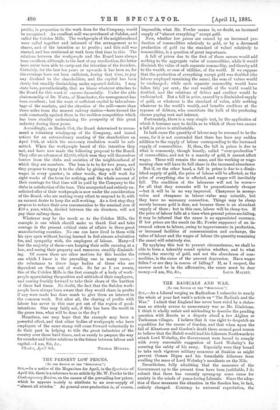THE PRESENT LOW PRICES.
ITO THE EDITOR OF THE " SPECTATOR." ]
Stn,—In a notice of the Magazines for April, in the Spectator of April 4th, there is a reference to an article by Mr. W. Fowler in the Contemporary Review, on the causes of the prevailing low prices, which he appears mainly to attribute to an over-supply of " almost all articles." As general over-production is, of course, impossible, what Mr. Fowler means is, no doubt, an increased supply of "almost everything" except gold.
Now, whether low prices are caused by an increased production of commodities relatively to gold, or by a .decreased production of gold (as the standard of value) relatively to commodities, is a question of great importance.
A fall of prices due to the first of those causes would add nothing to the aggregate value of commodities, while it would diminish the value of each separate commodity, and thereby add to the wealth, or sum of utilities, of the world. If we suppose that the production of everything except gold was doubled (the labour employed remaining the same), the sum of values would be unchanged ; while each separate commodity would have fallen fifty per cent., the real wealth of the world would be doubled, and the relations of debtor and creditor would be undisturbed. But a fall in price, caused by a diminished supply of gold, or whatever is the standard of value, adds nothing whatever to the world's wealth, and benefits creditors at the expense of debtors, who constitute the bulk of the producing classes paying rent and interest.
Fortunately, there is a very simple test, by the application of which it becomes easy to decide as to which of these two causes a fall in prices is attributable.
In both cases the quantity of labour may be assumed to be the same, for it is not contended that there has been any sudden addition to the supply of labour corresponding to the increased supply of commodities. If, then, the fall in prices is due to what is commonly, though loosely, called " over-production " of commodities, and not to a scarcity of gold, it cannot affect wages. These will remain the same, and the working or wageearning class will have its fall share in the increased abundance But if, on the other hand, a fall in prices is due to a diminished supply of gold, the price of labour will be affected, as the price of everything else is affected, and wages will inevitably fall. The condition of the labourers will not be worse— for all that they consume will be proportionately cheaper —but it will be in no way improved. Cheapness in money value and cheapness in labour -value may coincide, but they have no necessary connection. Things may be cheap merely because gold is dear, not because there is an abundant supply of them ; but in this case, labour will be cheap too. If the price of labour falls at a time when general prices are falling, it may be inferred that the cause is an appreciated currency.
If low prices are the result (as Mr. Fowler supposes) of an increased return to labour, owing to improvements in production, or increased facilities of communication and exchange, the value of labour and the wages of labour (its quantity remaining the same) will relatively rise.
By applying this test to present circumstances, we shall be able to form a tolerably sound opinion whether, and to what extent, the scarcity of gold, and not the abundance of commodities, is the cause of the present depression. Have wages fallen ? or are they in course of falling P If, as I suspect, the answer must be in the affirmative, the cause must be dear
money.—I am, Sir, &c., Louis MALLET.


































 Previous page
Previous page